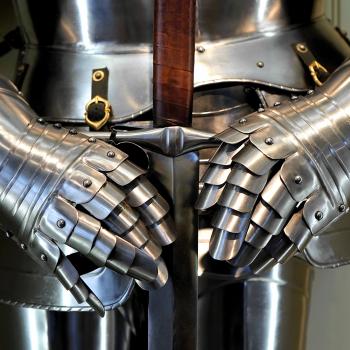To Train Up A Child, chapter 5, part 3
So, a number of you have noted that Michael is emphasizing that “the rod” is necessary because God said so, period, and has not been arguing that it is necessarily because it is actually good for the child. I’ve held back from answering this charge because I knew Michael would answer it soon enough. This week we begin to see Michael explain why the rod is absolutely inescapably a positive good for the child—and in fact, that children actually want to be “painfully whipped.”
5. UNDERSTANDING THE NEEDS OF THE CHILD
The very nature of the child makes the rod an indispensable element in child training and discipline. We will summarize the previous comments on the nature of a child (chapter 2) and then draw some important practical applications.
SUMMARY: “They go astray as soon as they be born, speaking lies (Psalm 58:3).” The infant, through natural drives for food, cuddling and bodily comfort, soon learns that by falsely representing his need he can gain excessive indulgences. But due to his immature reasoning faculties, God does not count the lie as sin. “Therefore to him that knoweth to do good, and doeth it not, to him it is sin. (James 4:17). Sin is not imputed where there is no law. (Rom. 5:13).” The infant, not knowing “good and evil (Deut. 1:39),” is not held responsible for his lack of conformity to the law. Nevertheless, infants do lie. And, children issue forth with a multitude of other selfishly motivated thoughts and acts that will, upon their coming to the “knowledge of good and evil,” constitute a “body of sin.”
Though they are not now to blame, there will come a time when, through the development of the understanding, the conscience will be awakened, and for these things they will be counted blameworthy.
Michael says that infants do not know the difference between good and evil, but that they already lie. Your small child, in other words, is already sinning, though it will not be counted as sin until she reaches the age of accountability. You need to ensure that your child does not reach that age still lying and sinning.
Your child is in a body of infirm flesh. The God-given drives toward the fulfillment of bodily needs and appetites form a constant and incessant occasion to lusts. The drive itself is not sin. Lust of the flesh is natural (Deut 12.’15). But when one is “drawn away of his own lust, and enticed,” and the lust conceives with opportunity, “… it bringeth forth sin (James 1:14, 15).”
You cannot prevent your children from the life of testing that this body of flesh (skin, blood and bones, with all its passions and needs) will bring. But you can train them in the disciplines necessary to not be given over to a selfishly indulgent life. The rod is your divine enforcer. “The rod and reproof give wisdom… (Prov. 29.’15).”
In other words, you have to use the rod to train your child out of sin before that child reaches the age of accountability and all of that sin is imputed to her. Also, every time your child goes beyond just wanting the basic fulfillment of her bodily needs, she has moved into the realm of “lust of the flesh.” And the rod is your “divine enforcer.”
Oh and also, this: “you can train them in the disciplines necessary to not be given over to a selfishly indulgent life.” I don’t know anyone who wants their child to be “given over to a selfishly indulgent life,” but Michael is sorely wrong in thinking that the only way to teach a child self control or self discipline is through imposing outside discipline a la the rod on them. In fact, Michael seems to rather have it backwards. If you want your child to grow up to be a caring, empathetic individual as an adult (one who does not not ignore the needs of others but also does not ignore her own needs), you teach your child to be a caring, empathetic individual as a child, and the rod rather defeats that purpose entirely.
Understand, we are not suggesting that a child can be trained into the Christian experience, only that the mind and body should be developed to its highest possible natural discipline. This cannot do other than aid the Spirit in convicting them of sin, causing them to realize their need for a Savior. We are talking about the lawful use of the law.
For some reason, all I can think of here is “THIS . . . IS . . . SPARTA!”
NEGATIVE FEELINGS
Understanding the development of a child helps us to understand his needs.
Self-indulgence and an unruled spirit will produce emotional dissatisfaction. An undisciplined child will be insecure. Lack of self-control produces anger. A failure to get one’s own way causes self-pity. Unfulfilled lust results in restless agitation. Feelings of being treated unfairly precipitate bitterness. Because of this, both the child and the adult have an innate need to be governed. Otherwise, purposelessness and lack of identity result. “A child left to himself bringeth his mother to shame (Prov. 9:15).”
As a child develops in his sense of “oughtness,” any violation of his own standards produces guilt. Guilt is involuntary self-accusation. It is the soul knowing itself and not liking what it sees. The smallest child who knows he has failed in doing what he ought suffers guilt. Although the child’s soulish faculties are not yet completely operative, nonetheless, a child who violates his budding conscience becomes burdened with guilt and self-loathing.
A child who is so burdened will only becomes more vile when lectured, shamed, ridiculed, deprived of some privilege, made to go to his room, made to sit in the corner, given a painless whipping or a jerking around accompanied by threats. This actually provokes the child to anger. The parent, by these responses, has magnified the problem. The child may be induced through one of these measures to yield temporary compliance, but his heart of uncleanness is confirmed in its evil.
Go ahead and reread those three paragraphs a couple of times. Yes, Michael says that what makes a child angry is not being hit with plumbing supply line but rather, well, not being hit with plumbing supply line. And yes, he said that not being spanked creates “bitterness,” because the child knows that by not being spanked she is being treated unfairly. And yes, there was this line: “both the child and the adult have an innate need to be governed.” In other words, as we’ll see, children actually want and need to be punished “with the rod,” for the sake of their own consciences and to free them from bondage to self.
And yes, Michael says the child who misbehaves feels “guilt and self-loathing.” And you read that next line—that any punishment besides a painful whipping just makes the child “more vile.” Yes, Michael really did say that it is the lack of a painful whipping (Michael’s words, not mine) that “provoke the child to anger.” And yes, he said that any punishment besides a painful whipping magnifies the problem, and that in these cases “his heart of uncleanness is confirmed in its evil.” Michael really did just write all of that.
I’m going to actually agree with Michael on two points. First, children who have parents who are neglectful may display some of the things he has talked about—a desire for just about any sort of attention at all from their parents, a feeling of being insecure, a desire for some sort of structure in their lives. This is not the problem of the parents not painfully whipping their children for misbehaving, it is a problem of needing emotional input from their parents that they are not getting.
Second, the punishments Michael mentions parents using in place of painful whippings—“lectured, shamed, ridiculed, deprived of some privilege, made to go to his room, made to sit in the corner, given a painless whipping or a jerking around accompanied by threats”—are almost universally negative, counterproductive, and unhelpful. No child responds well to being lectured or shamed or ridiculed. Sending a child to her room, or a corner, or depriving a child of a privilege may be more successful, but can be done very badly indeed, and can lead to frustration and anger on the child’s part. Jerking a child around or threatening a child is only worse. I have found that what works best is having a one-on-one person-to-person conversation with the child, helping them understand, listening to their input, and, if necessarily, collaborating with them on devising an appropriate consequence for a given type of misbehavior. If a child is completely losing it, kindly and gently helping the child get to a place where she can calm down is the only thing that works. Conversations about what happened can come afterwards.
While I object to the punishments Michael lists because they are ineffective and in many cases extremely unkind, Michael objects because they do not remove the evil or uncleanness from a child’s heart (something only a painful whipping can do). While I suggest parents choose parenting methods that are less punitive, Michael suggests they adopt parenting methods that are even more punitive, placing painful whippings front and center.
Realize also what Michael has done here—he has told parents that every method of punishment they know besides “the rod” is not only less effective than a painful whipping but is in fact counterproductive. In other words, he has removed from parents every tool they might use besides whipping their children. Whippings are not to be a fallback in Michael’s world, they are to be the first and only resource a parent has. Pity the children raised on Michael’s teachings.
I was going to keep going, but I can’t. In what follows this passage, Michael explains what he means about children’s self-loathing and guilt, and goes on about how much children actually want painful whippings, and can in fact only be happy if beaten.














